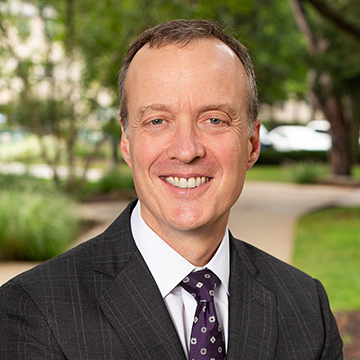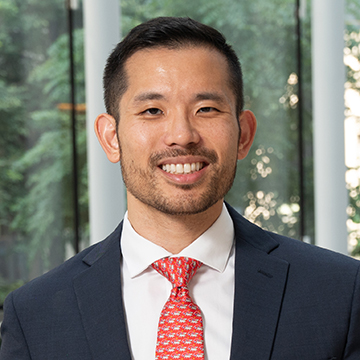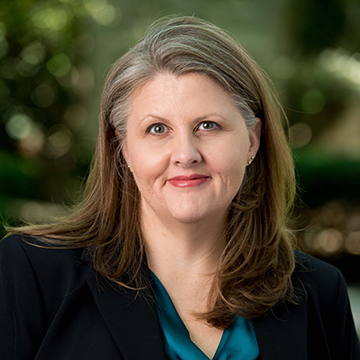‘Building on Legacy of Success,’ NUCATS Launches UM1
“If we’ve seen further, it’s by standing on the shoulders of giants,” said Clyde Yancy, MD, MSc, paraphrasing Isaac Newton’s famous line. “Building on a legacy of success, it’s important that this version of NUCATS marks a new beginning, one we envision will serve as an exemplar for what it means to be a CTSA hub.”
Joined by more than 50 leaders of the Northwestern University Clinical and Translational Sciences (NUCATS) Institute, principal investigators Richard D’Aquila, MD, Sara Becker, PhD, and Yancy officially launched the Institute’s seven-year, $55 million UM1 award from the National Center for Advancing Translational Science (NCATS).
The strategic-planning meeting on September 17, 2024, got under way with remarks from Northwestern Vice President for Research Eric Perrault, PhD, as well as NUCATS Founding Director Philip Greenland, MD, and previous NUCATS Director Donald Lloyd-Jones, MD, ScM.

Today marks a significant moment for the NUCATS team and the entire Northwestern community as we celebrate the largest active research award at the university.”
“Today marks a significant moment for the NUCATS team and the entire Northwestern community as we celebrate the largest active research award at the university,” said Perrault. “Most importantly, we will continue the journey to translate this grant into real-world impact.”
Co-facilitated by Kristi Hubbard, Director of Planning for University Priorities and Collaborative Engagement, and NUCATS Executive Director Nicole Woitowich, PhD, the daylong event explored major components of the grant, bringing diverse groups together to set objectives for the next two years. The meeting also provided space to engage with the award’s three aims: Include, Innovate, and Implement.
“Implementation science will help us to accelerate and catalyze the uptake of evidence-based practice as we strive to provide all patients with access to the best healthcare, more quickly and more equitably,” said Becker, the Alice Hamilton Professor of Psychiatry and Behavioral Sciences and director of Northwestern’s Center for Dissemination and Implementation Science. “We can’t wait to use these methods until teams have late-stage, multisite trials. We have to promote the notion that these methods must be used in our earliest — and even smallest — studies.
These awards are meant to stimulate investigators from a wide variety of disciplines and backgrounds to lend their expertise to translational science research.”

Early morning meeting sessions focused on the NUCATS Institute’s team-based governance structure and operational principles. Participants then broke into thematic teams organized around NCATS priority topics. Discussions on specific grant modules created an opportunity to collaboratively develop year one objectives and milestones.
Becker, who is also director of Northwestern’s Center for Dissemination and Implementation Science, arrived at Northwestern in 2022, as the groundwork for “NUCATS 4.0” was being laid. She introduced Dennis Li, PhD, MPH, assistant professor of Psychiatry and Behavioral Sciences, who co-directs the Translational Science Pilot Grant Program with Sadiya Khan, MD, MSc, Magerstadt Professor of Cardiovascular Epidemiology. Li shared the team’s vision for how the pilot grant program will serve as a translational science research engine across the health system.
“These awards are meant to stimulate investigators from a wide variety of disciplines and backgrounds to lend their expertise to translational science research. They represent a key indicator of success for our CTSA because they reflect where the next generation of established researchers will take their investigations." Li said. “The primary requirement is that investigators have one or more aims dedicated to advancing translational science.”
Translational science — a major component of the new grant structure — is broadly described by NCATS as the field that generates scientific and operational innovations that overcome longstanding challenges along the translational research pipeline.

Informatics is fundamentally a team sport, and the impact of informatics and data science can be seen every day across our enterprise. It’s an exciting time on campus.”
D’Aquila, who leads the innovation aim, and who has been NUCATS director since 2020, spoke more about the goals of translational science.
“A core principle of translational science is to understand common causes of inefficiency and failure in translational research projects and develop ways to overcome those challenges,” said D’Aquila, the Howard Taylor Ricketts, MD, Professor of Medicine in the Division of Infectious Diseases, and senior associate dean for clinical and translational research.
D’Aquila also introduced Kristi Holmes, PhD, director of informatics and data science, who shared how NUCATS will embrace principles of open science and data sharing to spur innovation.
“Informatics is fundamentally a team sport, and the impact of informatics and data science can be seen every day across our enterprise,” said Holmes. “It’s an exciting time on campus, and I look forward to nurturing this important area of work.”
The translation of novel discoveries from the laboratory to routine clinical care remains a slow, complex, and labor-intensive process, characterized by lengthy delays at each stage of the translational continuum and failure of more than 80% of scientific discoveries to ever impact human health. Founded in 2008, the NUCATS Institute will use each aim to advance, continually evaluate, and improve inclusive, innovative, and implementable solutions to the evolving, urgent challenges that impede universal, scalable public health progress.
“I was sitting in the room with Francis Collins nearly 15 years ago when this whole idea of Clinical and Translational Science hubs was birthed,” said Yancy, chief and Magerstadt Professor of Cardiology in the Department of Medicine. “We went through a lot of fretful iterations in those early years, but we figured it out. Now there are 60 sites across the country, 60 opportunities to really go from ideas to discovery and to implement them in a way that can affect all.”
Yancy will lead the Include aim with the stoic vision he’s maintained as Vice Dean for Health Equity.
During the second half of the day, NUCATS leadership brainstormed on how to advance communications before convening in workgroups centered on each of the grant’s three strategic aims — Innovate, Include, Implement. The NUCATS team identified areas of synergy and collaboration, reporting out at the conclusion of the meeting.
“One question we must ask ourselves is, can we be sufficiently unique across all three aims to become a national model for others,” Yancy asked. “I look at the faces in this room and I think we can.”
Written by Roger Anderson




